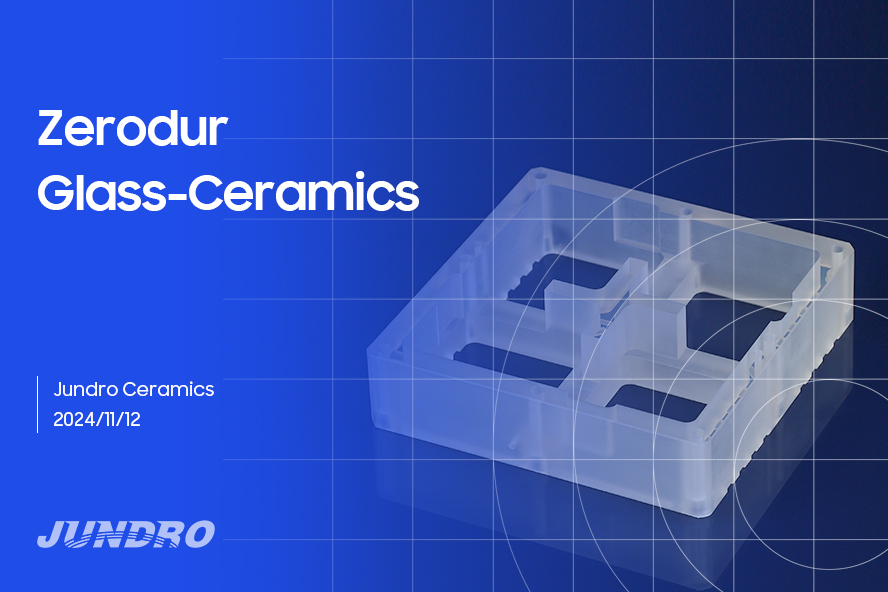
Zerodur Glass-Ceramics: In-depth Analysis of Thermal Expansion Coefficient and Properties
Introduction to Zerodur
ZERODUR It is a unique glass ceramic material developed by Schott GmbH in Germany, located between glass and crystal, known for its ultra-low thermal expansion characteristics. Its structure contains nanoscale crystals, evenly distributed in the glass matrix, and undergoes precise tempering treatment to maintain excellent dimensional stability over a wide temperature range. ZERODUR combines the stability of glass with the strength of ceramics, with an overall thermal expansion coefficient close to zero, making it suitable for applications that require extremely high precision under temperature changes, such as astronomical telescopes, semiconductor manufacturing equipment, and aerospace instruments. Its high quality and extremely low thermal expansion make it an ideal choice for these high-tech fields
The Importance of Zerodur Thermal Expansion Coefficient
The coefficient of thermal expansion (CTE) is a key parameter in materials used for high-precision engineering, as it measures the degree of expansion or contraction of materials when exposed to temperature changes. Zerodur's low CTE makes it stand out among materials such as glass and other glass ceramics, providing significant advantages in environments where even small size changes can affect accuracy. For industries that rely on precision optics and mechanical structures, Zerodur's near zero expansion provides reliability and accuracy during temperature fluctuations, avoiding common stress, deformation, and misalignment issues in standard materials
Material | α (ppm/K) |
Polycarbonate | 70 |
Aluminum | 22.7 |
Bronze | ≈ 17 |
Steel | 10–17 |
Optical Glass N-BK7 | 7.1 |
Optical Glass N-ZK7 | 4.5 |
Borosilicate Glass (Duran/Pyrex®) | 3.3 |
Borosilicate Glass E-6 | 2.9 |
Silicon Carbide (Boostec SIC®) | 2.2 |
Fused Silica | 0.51 |
Titanium-Doped Fused Silica (ULE®) | 0 ± 0.030 |
Zerodur | 0 ± 0.007 |
Materials like Zerodur and ULE® are highly stable, with near-zero thermal expansion, making them ideal for precision optics and applications requiring minimal thermal deformation.
Although traditional glass materials expand significantly with temperature changes, Zerodur's expansion is almost zero, even over a large temperature range. This stability is in sharp contrast to other low expansion materials, such as fused silica or borosilicate glass, which still exhibit measurable expansion, especially at low temperatures. The ability of Zerodur to maintain precise dimensions is invaluable for space applications, as standard materials may fail under fluctuating thermal conditions
The composition and structure of Zerodur
The structure of Zerodur is a balanced mixture of glass and ceramic phases, specifically designed to maintain a highly stable matrix. This structure can not only resist deformation under temperature changes, but also maintain its mechanical integrity under various environmental stresses. The low expansion performance of Zerodur is achieved by carefully controlling its composition, including silicon dioxide, aluminum oxide, and titanium oxide, which nucleate in specific proportions to produce stable, near zero expansion microcrystalline glass
Zerodur's thermal performance
Zerodur coefficient of thermal expansion
The thermal expansion coefficient of Zerodur is typically defined as 0 ± 0.007 x 10 ⁻/K within the temperature range of approximately -50 ° C to+50 ° C. This tailored low scalability is crucial in applications such as satellite mirrors and interferometry. For temperatures beyond this range, especially under low temperature conditions, custom grade Zerodur can be provided, offering optimized CTE to meet extreme requirements.
CTE Grades | CTE (0°C; 50°C)* |
ZERODUR® Expansion Class 2 | 0 ± 0.100 ・ 10-6/K |
ZERODUR® Expansion Class 1 | 0 ± 0.050 ・ 10-6/K |
ZERODUR® Expansion Class 0 | 0 ± 0.020 ・ 10-6/K |
ZERODUR® Expansion Class 0 SPECIAL | 0 ± 0.010 ・ 10-6/K |
ZERODUR® Expansion Class 0 EXTREME | 0 ± 0.007 ・ 10-6/K |
ZERODUR® TAILORED | TAILORED ± 0.020・10-6/K (± 0.010・10-6/K upon request) Optimized for application temperature |
Zerodur's performance can be customized for specific temperature ranges to meet unique industry requirements. In addition to low CTE, Zerodur also has good thermal conductivity and heat capacity characteristics. These factors contribute to its ability to maintain temperature balance, which is crucial for optical applications as heat dissipation is essential to avoid distortion in accurate imaging or measurement.
Application of Zerodur Microcrystalline Glass
Astronomical telescope: Large astronomical telescopes require materials with ultra-low expansion to maintain alignment and focus, despite daily temperature cycles.
Semiconductor manufacturing: Zerodur is used for wafer inspection and lithography machines, where even small changes can result in significant yield losses.
Scientific instruments such as spectrometers and interferometers rely on Zerodur's dimensional stability for precise measurements.
Aerospace and satellite optics: Extreme temperature changes are common in space, and Zerodur provides structural stability, avoiding deformation of satellite mirrors and optical components, which is crucial for accurate imaging.
About Jundro Ceramics
Since 2019, Jundro has been renowned for its excellent high-precision machining parts development and production services. As an expert in custom manufacturing of ceramics, glass, sapphire, and other hard materials, Jundro focuses on manufacturing customized parts that meet special performance requirements, providing strict tolerances and excellent processing quality for high-precision equipment.
Dongguan Jundro ceramics Technology Co.,Ltd
E-mail:info@jundro.com
Tel:+86-769-82913501
Fax:+86-769-82913801
Add: Room 306, Gate B, Unit 1, Block 2 South, No. 1 Yile Road, Songshan Lake, Dongguan City, Guangdong Province, China(523808)
© August Dongguan Jundro ceramics Technology Co.,Ltd- 2023